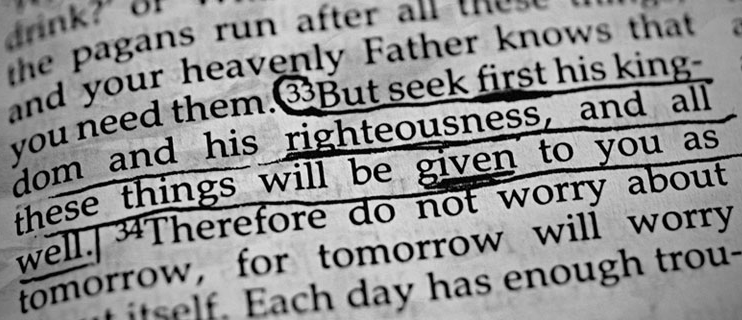“When you fast, don’t be like the sullen-looking pretenders,
for they make their faces unsightly
—so their fasting will be seen by men!1
Truly I tell you, they have received their payment in full.
“But when you fast,
put oil on your head and wash your face!
Then it will not be obvious to others that you are fasting,
but only to your Father,
who is in secret;
and your Father,
who sees what is done in secret,
will pay you.“Do not store up for yourselves stores of things in the land,
where moth-worms and eating-rust make unsightly,
and where thieves break in and thieve-away.
But store up for yourselves stores of things in Heaven,
where moth-worms and eating-rust don’t make unsightly,
and where thieves don’t break in and thieve-away.
For wherever your “store of things” is, there your heart will be also.“The eye is the lamp of the body.
If your eyes are good [if you are generous],2
your whole body is light.
But if your eyes are bad [if you are greedy and envious],2
your whole body is darkness.
If then the light in you is darkness, how much is that darkness!?“No one can serve two bosses.
Either you will hate the one and love the other,
or you will hold tightly to the one and hold in contempt the other.
You cannot serve both God and Riches.“In this I tell you,
don’t be concerned about your life,
what you will eat or drink;
or about your body,
what you will wear.
Is not life more than food,
and the body more than clothes?“Look at the birds of the air;
they do not sow or reap or store away in storage sheds,
and yet your heavenly Father feeds them.
Aren’t you much more valuable than they?
Can any one of you by being concerned
add a foot of difference to the prime of your life?“And why are you concerned about clothes?
See how the flowers of the field grow.
They do not labor or spin.
Yet I tell you that not even Solomon
—in all his splendor—
was dressed like one of these.“If that is how God clothes the grass of the field,
which is here today
and tomorrow is thrown into the fire,
will he not much more clothe you
—you of little faith?“So don’t be concerned,
saying, ‘What will we possibly eat!?’
or ‘What will we possibly drink!?’
or ‘What will be possibly wear!?’
All this is what the rest of humanity is on the lookout for,
(and your heavenly Father knows that you need them).
But you, be on the lookout first for His kingdom and His justice,
(and all these things will be added to you as well).“So don’t be concerned about tomorrow,
for tomorrow will be concerned with itself.
There’s enough trouble in a day.”(Jesus to his followers
Matthew 6.16–34 a fairly literal personal translation)[divider_1px]
1 The Greek here is fascinating in it’s possibilities. The word I have translated “unsightly” is aphanizousin/ἀφανίζουσιν, the root of which ranges in meaning from “make unseen” to “destroy/ruin”. It’s the same word that is used later for the work of the moth-worms and “eater” (brōsis, “eating-rust” in my translation, “vermin” in others). It could mean, as many translations suggest, that they “disfigured/ruined” their faces, but the primary meaning of its root, aphanizō, is “non-seen” or “unseen”, and plays well upon “being seen” (phanizō) later in the verse. These pretenders (hypocrites) “hide their faces” in order to “be seen”, whereas the followers of Jesus are encouraged to essentially “shine up” their faces in order to practice their fasting in a manner that is “not seen”.
2 The idioms “good eye” and “evil eye” (or “bad eye”) are common phrases in many ancient (and some modern) Mediterranean cultures. They typically refer to “generous” and “covetous/envious”, respectively. The person with a “good eye” sees those in need and acts with mercy/charity. The person with the “evil eye” only sees what they want and desires the misfortune of another so their goods/status may be taken. Other examples of this in Scripture are Matthew 20:15, where Jesus has the master in the story say: “Is it not right for me to do what I want with what belongs to me? Or is your eye evil because I am good?” (“Are you envious because I’m good?”). In the Hebrew scriptures, the “evil eye” is mentioned in Deuteronomy and Proverbs:
“Take care lest there be an unworthy thought in your heart and you say, ‘The seventh year, the year of release is near,’ and your eye look grudgingly on your poor brother [“have and evil eye on your brother”], and you give him nothing, and he cry to the LORD against you, and you be guilty of sin.” (Deuteronomy 15.9 ESV)
“Do not eat the bread of a man who is stingy [“evil eye”]; do not desire his delicacies.” (Proverbs 23:6 ESV)
“A stingy man [“man of the evil eye”] hastens after wealth and does not know that poverty will come upon him.” (Proverbs 28.22 ESV)
A good eye is mentioned in Proverbs 22:9:
“Whoever has a bountiful eye [“good eye”] will be blessed, for he shares his bread with the poor.” (Proverbs 22.9 ESV)
